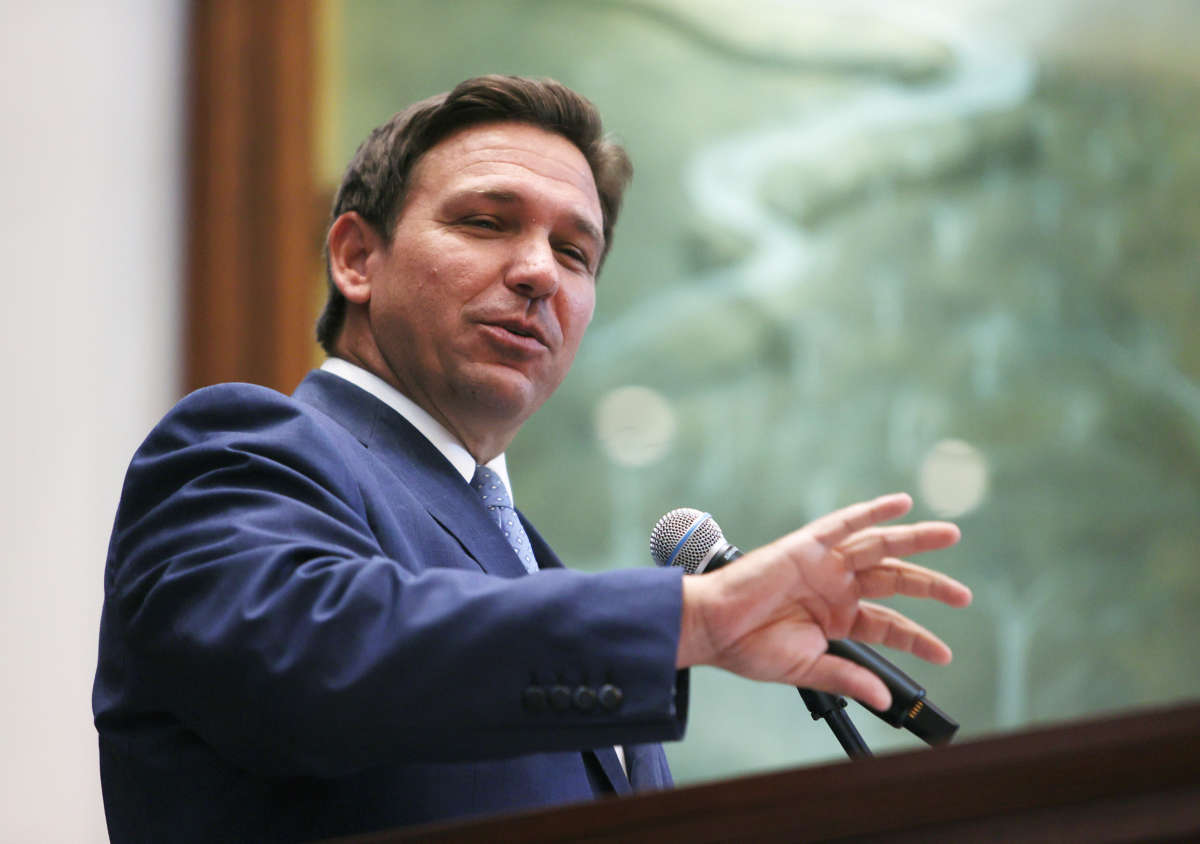Support justice-driven, accurate and transparent news — make a quick donation to Truthout today!
Black lawmakers and voting rights activists in Florida are blasting newly introduced legislative maps proposed by Gov. Ron DeSantis (R), calling them “overtly racist” for diluting the voices of non-white voters in the state.
DeSantis previously vetoed maps drawn by the Republican-led legislature, complaining at the time that they weren’t made in a way that was “race-neutral.” Republican lawmakers and DeSantis then decided that the governor would redraw the maps himself, which he submitted for consideration earlier this week.
Critics of those maps say that they will diminish the influence of Black voters. In the state’s Fifth Congressional District, for example, currently held by Rep. Al Lawson (D), communities with Black voters are being shifted into a different district altogether, making it more “Republican-friendly,” The Orlando Sentinel reported.
The proposed redistricting maps are part of “a continued scheme by DeSantis to erase minority access districts in Congress in order to create more seats for the Republican Party,” Lawson said.
Other districts are also being impacted by the changes, including in the northern portions of the state, where Black voters are being shifted to other districts altogether to give Republicans better advantages. Within the 13th Congressional District, for instance, the new maps would cut the Black voter population nearly in half.
State Sen. Randolph Bracy, a Democrat from Orlando who is running for Congress this year, called the proposed maps an “overtly racist action” by DeSantis.
“The fact he has the gall to do something like this clearly shows what he thinks of minorities and Black voters. It’s stunning in this day and age he would try to wipe out Black representation,” Bracy added.
The proposed maps were also condemned by Terri Lipsey-Scott, executive director of the Woodson African American Museum of Florida. “It just really saddens me that there is the constant desire to diminish and to deprive African Americans of an opportunity to have impact in the political process,” she said.
The maps appear to be drawn in an explicitly partisan way, added Ellen Freidin, leader of Fair Districts Now, a redistricting reform group. While federal judges are restricted from issuing rulings that tackle partisan gerrymandering elsewhere in the country, Florida voters passed a ballot measure in 2010 making politically-motivated redistricting illegal.
“This is repression of voters in the state of Florida in 2022,” Freidin told The Tampa Bay Times.
The maps, if passed by the state legislature and signed into law by DeSantis later on, will likely produce a 20-8 U.S. House delegation advantage favoring Republicans over Democrats, widening the current 16-11 advantage Republicans presently have.
The maps will almost assuredly be challenged, and there’s good reason to believe that they might be tossed by the courts should a lawsuit come about — as the Cook Political Report’s U.S. House Editor Dave Wasserman noted, they were drawn “in ways that previous courts have struck down” — but any action will have to be taken fast, as districts need to be finalized before June 17, the end of the candidate qualifying period.
Press freedom is under attack
As Trump cracks down on political speech, independent media is increasingly necessary.
Truthout produces reporting you won’t see in the mainstream: journalism from the frontlines of global conflict, interviews with grassroots movement leaders, high-quality legal analysis and more.
Our work is possible thanks to reader support. Help Truthout catalyze change and social justice — make a tax-deductible monthly or one-time donation today.
